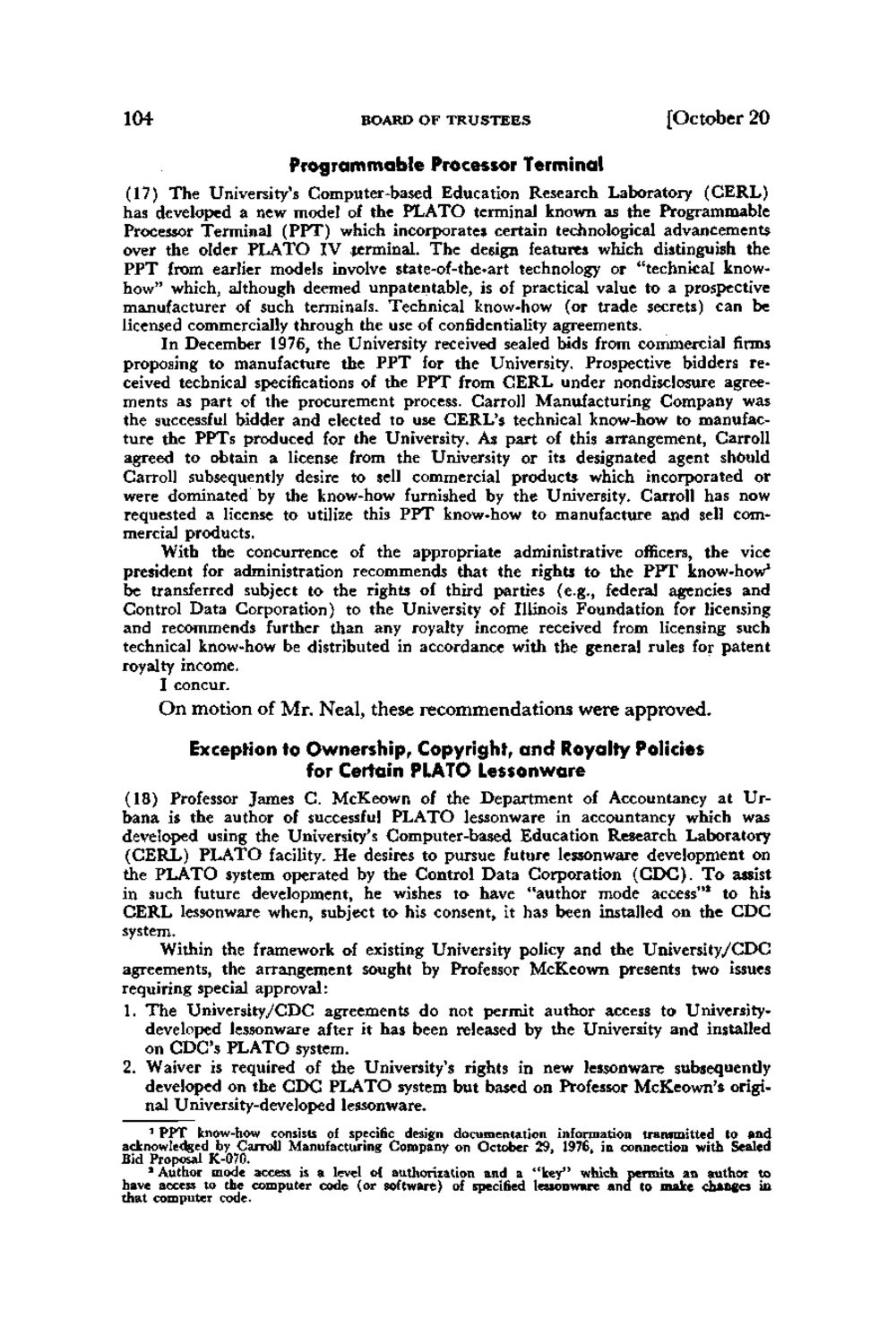Caption: Board of Trustees Minutes - 1980
This is a reduced-resolution page image for fast online browsing.

EXTRACTED TEXT FROM PAGE:
104 BOARD OF TRUSTEES [October 20 Programmable Processor Terminal (17) The University's Computer-based Education Research Laboratory (CERL) has developed a new model of the P L A T O terminal known as the Programmable Processor Terminal (PPT) which incorporates certain technological advancements over the older P L A T O IV terminal. The design features which distinguish the P P T from earlier models involve state-of-the-art technology or "technical knowhow" which, although deemed unpatentable, is of practical value to a prospective manufacturer of such terminals. Technical know-how (or trade secrets) can be licensed commercially through the use of confidentiality agreements. In December 1976, the University received sealed bids from commercial firms proposing to manufacture the P P T for the University. Prospective bidders received technical specifications of the P P T from C E R L under nondisclosure agreements as part of the procurement process. Carroll Manufacturing Company was the successful bidder and elected to use CERL's technical know-how to manufacture the PPTs produced for the University. As part of this arrangement, Carroll agreed to obtain a license from the University or its designated agent should Carroll subsequently desire to sell commercial products which incorporated or were dominated by the know-how furnished by the University. Carroll has now requested a license to utilize this P P T know-how to manufacture and sell commercial products. With the concurrence of the appropriate administrative officers, the vice president for administration recommends that the rights to the P P T know-how 1 be transferred subject to the rights of third parties (e.g., federal agencies and Control Data Corporation) to the University of Illinois Foundation for licensing and recommends further than any royalty income received from licensing such technical know-how be distributed in accordance with the general rules for patent royalty income. I concur. O n m o t i o n of M r . N e a l , t h e s e r e c o m m e n d a t i o n s w e r e a p p r o v e d . Exception to Ownership, Copyright, and Royalty Policies for Certain PLATO Lessonware (18) Professor James C. McKeown of the Department of Accountancy at Urbana is the author of successful P L A T O lessonware in accountancy which was developed using the University's Computer-based Education Research Laboratory (CERL) P L A T O facility. He desires to pursue future lessonware development on the P L A T O system operated by the Control Data Corporation ( C D C ) . T o assist in such future development, he wishes to have "author mode access"* to his C E R L lessonware when, subject to his consent, it has been installed on the CDC system. Within the framework of existing University policy and the University/CDC agreements, the arrangement sought by Professor McKeown presents two issues requiring special approval: 1. T h e University/CDC agreements do not permit author access to Universitydeveloped lessonware after it has been released by the University and installed on CDC's P L A T O system. 2. Waiver is required of the University's rights in new lessonware subsequently developed on the CDC P L A T O system but based on Professor McKeown's original University-developed lessonware. 1 PPT know-how consists of specific design documentation information transmitted to and acknowledged by Carroll Manufacturing Company on October 29, 1976, in connection with Sealed Bid 3 Proposal K-070. Author mode access is a level of authorization and a "key" which permits an author to have access to the computer code (or software) of specified lessonware and to make changes in that computer code.
|